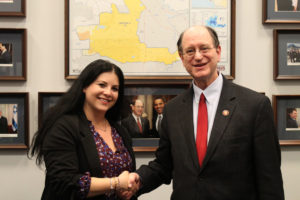While in Washington, D.C. for the Lemkin Summit, I had the opportunity to meet with several members of Congress and/or their staff to discuss current or upcoming legislation related to the prevention of genocide and mass atrocities. Because 2019 ushered in a new Congress, everything done by the previous Congress has been thrown out, and we begin again. That means, even if a bill or resolution was passed in one chamber prior to the changing of the guard, it must start from zero all over again and be introduced. Moreover, since this Congress is relatively new, and members are settling into their new posts and responsibilities, legislation on issues related to our cause is has been moving slowly. With a few exceptions, there aren’t many robust pieces of legislation backed by a substantial number of co-sponsors.
While this environment creates its challenges, in terms of handing a member of Congress a polished, well-supported piece of bipartisan legislation, it does have its benefits, too. With a relatively clean slate, JWW and our partners can alert congressional officials to atrocity situations and legislative gaps — needs in our movement that they can proactively work to fill. Hopefully, with our urging, someone will introduce companion legislation to speed up the process of creating pro-prevention law; hopefully someone will link up with another legislator already taking the lead on an important and timely issue, thereby piquing the interest of other members of Congress; hopefully someone will reintroduce a bill that had garnered heavy support last year and remains as important today as it was then. Sometimes just inspiring a policymaker to write a letter or issue a statement can play a tremendous role in bolstering social change activism on the ground.
My legislative “asks” varied, depending on with whom I was speaking and what chamber they belonged to. But, here is a summary of the country situations for which I advocated and the legislation I promoted:
- BURMA / MYANMAR: Legislation to ensure the safe, dignified, voluntary and sustainable return of the Rohingya to their home country of — Myanmar, should they choose to return.
- CHINA: Legislation condemning the human rights violations perpetrated against the Uyghurs, a Muslim minority group subjected to horrific human rights abuses in the country. See S.178 and H.R. 649.
- DEMOCRATIC REPUBLIC OF THE CONGO: Now that a new president has come to power in the Democratic Republic of the Congo (DRC) we are in a holding period — waiting to see how the situation on the ground unfolds, particularly President Felix Tshisekedi’s relationship with outgoing kleptocrat Joseph Kabila. Congo is very dear to JWW, not only because of the many projects we have on the ground there but also because of the incredible people we have been honored to meet. Getting to the bottom of the killings in the Beni region of the North Kivu region has become a passion project of mine, particularly since I have been corresponding with many local activists who have raised legitimate concerns about the disproportionate impact these atrocities have had on members of the Nande tribe. The victims of this unmitigated violence, that has been occurring since 2014 but ramped up substantially in the run-up to the elections, have been almost exclusively Nande. Yet, no impartial investigation has looked into these massacres, and there are many contradictory narratives about the identity of the perpetrators or the motivations underlying their brutality. I asked every single staff member or representative I spoke with to call for an immediate investigation into the protracted killings.
- SUDAN: Legislation to stop the normalization process between the U.S. and the Government of Sudan in light of the ongoing people’s protest, now entering its third month. Sudan wants to be removed from the U.S. list of state sponsors of terrorism, which comes with various financial consequences, including the inability to receive debt relief or foreign direct investment. Several years ago, the U.S. removed its sanctions on Sudan — and the removal of this designation would be the next step in the process of normalizing relations between the two countries. JWW believes that any further normalization efforts would send the wrong message to the people of Sudan, who have been taking to the streets en masse, day-after-day, calling for Sudanese President Omar al-Bashir’s ouster and the establishment of true democracy. A House bill is in the works, and JWW is working to alert members of Congress in order to generate momentum and support in both chambers.
- SYRIA: Legislation to ensure the responsible withdrawal of American troops from Syria, particularly in relation to the Syrian Kurds, longtime U.S. allies in northeastern Syria, facing imminent attack from neighboring Turkey. See H.R. 914.
- YEMEN: These meetings are a time to also thank our electeds for the good work they have done on behalf of their constituents to curb mass atrocity situations around the world. I’m pleased to report that all of the members of Congress I visited had endorsed the removal of U.S. forces from the hostilities in Yemen. See S. J. Res. 7 and H.J. Res. 37.
Thank you to the members of Congress and your staff for taking the time to talk with me and for your openness to learning more. JWW will continue to advocate for these and other pieces of legislation in order to keep the U.S. engaged in the fight against genocide and mass atrocities worldwide. Every statement from a member of Congress, every letter, every passage of a bill or resolution — even if in just one chamber — has an immense impact on local civil society and the survivors of genocide and mass atrocity. Let us join together to let them know we see them and to amplify their voices.


